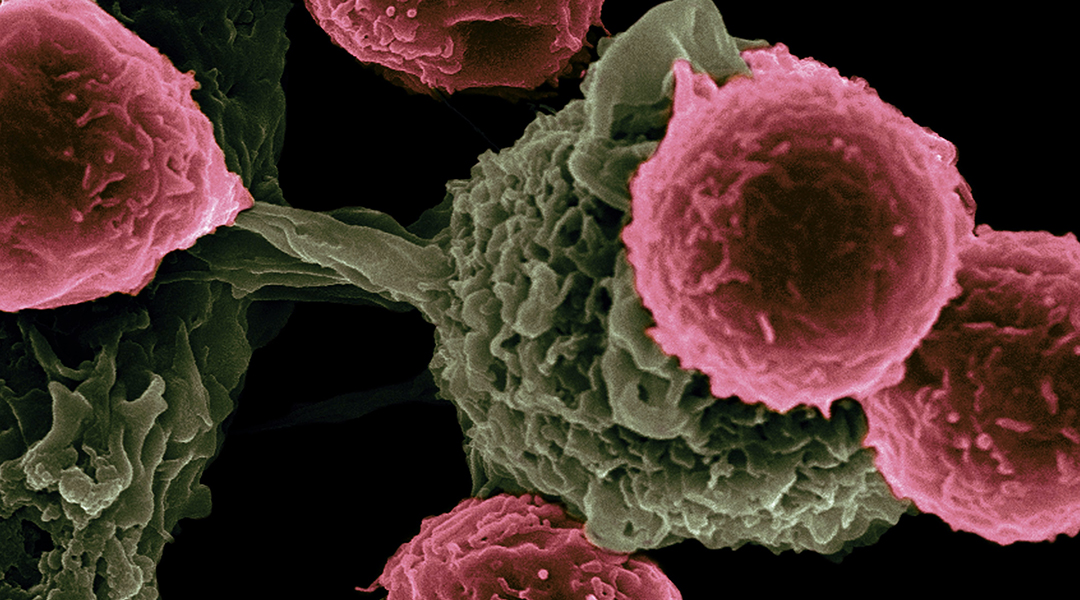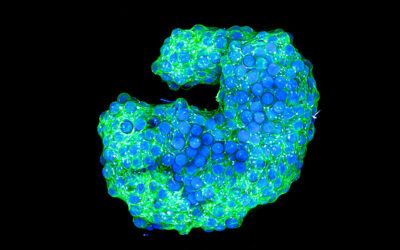Image credit: National Cancer Institute
A team of Korean researchers have developed a treatment for solid tumors to overcome the immunosuppressive mechanisms that limit T cell immunotherapies. To do this, they used “nanovesicles” derived from T cells to block the suppressive actions of tumors that quieten resident tumor-killing T cells, packing their own punch.
Immune-based therapies have recently gained traction in the treatment of cancers. A patient’s own immune cells are harvested and the numbers expanded in the laboratory to be re-infused to kill cancer cells — T cell immunotherapy is one such example.
To protect themselves from immune destruction, tumors produce factors to subdue cancer-targeting T cells produced by the body, hampering natural immunity, immunotherapies, and allowing the cancer to progress. Tumor cells secrete tumor growth factor (TGF)-beta and display a protein called programmed death ligand-1 (PD-L1) on their surface; these are molecules intended to switch off the attack program of tumor-killing T cells. Immunologists call this dampening process “T cell exhaustion”.
Upon activation, T cells increase expression of receptors for TGF-beta and PD-L1, both retained on the membranes of nanovesicles. The researchers mechanically pushed activated killer T cells through a series of membranes with micro- and nano-sized pores to create these nano-sized vesicles.
As reported recently in Advanced Materials, these nanovesicles injected into tumor sites prevented T cell exhaustion. Endowed with TGF-beta receptor and programmed death (PD)-1, the nanovesicles blocked the immunosuppressive effects of tumor cells on local T cells. TGF-beta receptor mopped up suppressive molecules secreted by tumors and interfered with the engagement of tumors with T cells via immune checkpoint molecules PD-L1 and PD-1.
The nanovesicles themselves were resistant to the immunosuppression by tumors. Instead, they were loaded with tumor killing molecules — upregulated during T cell activation — to make their own assault on tumor cells.
“T-cell derived nanovesicles can exhibit multiple anti-tumor mechanisms — such as delivery of immune checkpoint inhibitors and cytotoxic molecules, and scavenging of immunosuppressive molecules — leading to effective prevention of T cell exhaustion in the immunosuppressive tumor microenvironment. They can also directly kill tumor cells,” said Professor Byung-Soo Kim of Seoul National University who led the study.
When tumor-bearing mice were treated with T-cell derived nanovesicles, the growth of their tumors slowed and their survival rate improved.
“This study shows the potential of nanovesicle therapy for cancer treatment. These nanovesicles have the potential to exhibit multiple anti-tumor mechanisms and overcome the limitation of loss of anti-tumor activity of the immune cells in the immunosuppressive tumor microenvironment,” said Kim.
Reference: Jihye Hong, et al., T-Cell-derived nanovesicles for cancer immunotherapy, Advanced Materials (2021). DOI: 10.1002/adma.202101110

















